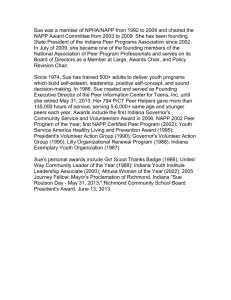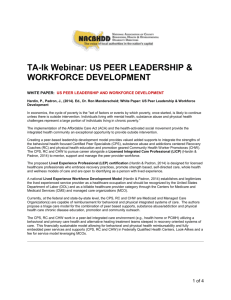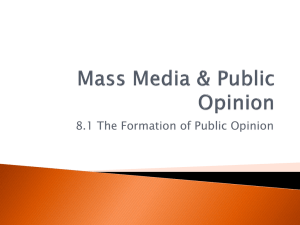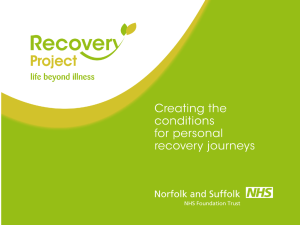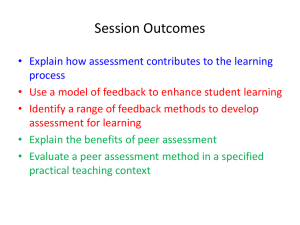Resource - Indiana Rural Health Association
advertisement
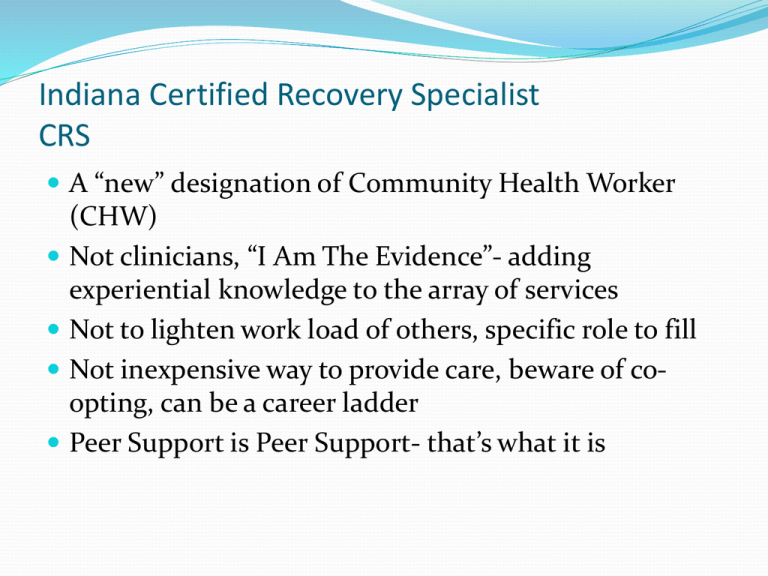
Indiana Certified Recovery Specialist CRS A “new” designation of Community Health Worker (CHW) Not clinicians, “I Am The Evidence”- adding experiential knowledge to the array of services Not to lighten work load of others, specific role to fill Not inexpensive way to provide care, beware of coopting, can be a career ladder Peer Support is Peer Support- that’s what it is Behavioral Health Peer Support in Rural Indiana for Employers Workforce development continues to be a critical issue in rural areas Limited availability of trainings, trainees, expense Economic limitations, reimbursement for services Workforce development, centralized data collection, utilization of outcome measures, updating materials. Integration into continuum, array of services Development and support- insuring everyone who chooses to has access to peer support Behavioral Health Peer Support in Rural Indiana for CHW/CRS Transportation to trainings, and for work Availability of trainings/costs of trainings Reimbursement rates limit employment opportunities for peers Accommodating peers who have limitations regarding a choice of supporters Access to work improvement trainings Meeting the Challenge 3 day training Indiana State Certified Community Health Worker. Open to the public, based on availability 2 additional days for the Indiana State Certified Recovery Specialist designation for those who qualify Follow-up opportunities for qualified persons in Substance Abuse, Gambling Addiction, other Specialties Ongoing availability of free CEUs (21 hours available, 14 hours required) Monthly conference calls, archived webinars, conferences and workshops Continued work with employers, promotion of peer support as a value added service, beginning to gather data, “keeping an ear to the ground” to stay abreast of changing challenges and opportunities Meeting the Challenge Education for employers on Peer Recovery Services as defined by Indiana’s MRO program Assisting in understanding reimbursement rates Understanding workforce development Periodic trainings, archived webinars Work place preparation, supervision, integration Participation in Recovery Oriented Systems of Care Mechanisms for CHW to provide their unique contributions in planning and development, being major decision makers in policy, innovators in the workplace A flexible workforce, moving seamlessly through healthcare delivery, able to adjust to a wide variety of environments Ensuring availability of updates for a continuously improving and expanding workforce Are CRSs also CHWs? Do not provide clinical care Most do not hold another license Experiential knowledge is key to success Intense involvement in relationship building Relate as peers Achieve what others cannot CRSs as CHWs Role in integrated care Role in dual diagnosis treatment Other Emerging Specialties Housing Forensic Family Veterans Addiction Integrated Peer Workforce “Leveraging community health workers is an evidence-based practice known to improve overall public health,” said Gregory N. Larkin, M.D., former Indiana State Health Commissioner The CHW umbrella encompasses many job titles including Certified Recovery Specialist, Care Transition Coordinator and Patient Navigator. Health Care Reform Focus on health care homes (including person- centered care and shared decision-making) Inclusion of patient navigators (“community members who are trained in strategies to connect individuals to care, to help them overcome barriers to receiving care, and to assist them in various other ways through their course of treatment”) Behavioral Activation Helping people prepare for health care visits and ask questions Identifying and setting health-related goals Planning specific action steps to achieve goals Encouraging exercise and good nutrition Assisting in daily management tasks and problemsolving Providing social and emotional support and feedback How to calculate return in an Accountable Care Environment? Consider reimbursement against real cost Consider gains in reduction of missed appointments, in-patient service utilization, medication compliance Consider improvement in efficient use of staff time as evidenced by preparation for meaningful appointments with clinicians and prescribers Distribution of CRSs “It’s not—like you might think—that you don’t have the money to offer recovery support services, but rather that you don’t have the money not to offer them.” - Keith Humphreys Positive Health Outcomes Decrease in high-risk behaviors for HIV Decreased infant mortality Decreased psychiatric symptoms Significant decreases in HbA(1c), body mass index, total cholesterol, LDL cholesterol, and systolic and diastolic blood pressure among persons with diabetes (Davidson, 2012) More Positive Outcomes Increased rates of engagement and retention Improved trust and communication between patients and health care providers Improved adherence and self-care Improved quality of life (Davidson, 2012) To Summarize Indiana has a strong Certified Recovery Specialist Program that has been noted nationally as an exemplary program. (Pillars of Peer Support 2011) The peer services movement continues to grow and diversify. The provision of peer services adds value to a recovery-oriented system of care. Evidence base is growing along with expansion of peer workforce. Health care reform represents an unprecedented opportunity to solidify the role of peers in mental health and whole health. Questions? Bruce Van Dusen AAS Bruce.vandusen@fssa.in.gov 317-232-7912

